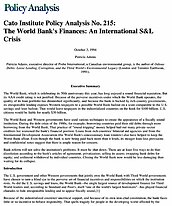The World Bank, which is celebrating its 50th anniversary this year, has long enjoyed a sound financial reputation. But its AAA credit rating is not justified. Because of the perverse incentives under which the World Bank operates, the quality of its loan portfolio has diminished significantly, and because the bank is backed by rich-country governments, its irresponsible lending exposes Western taxpayers to a possible World Bank bailout on a scale comparable to the U.S. savings-and-loan bailout. That would leave taxpayers in the industrialized countries on the hook for $100 billion; U.S. citizens would be liable for nearly $30 billion.
The World Bank and Western governments have used various techniques to create the appearance of a fiscally sound institution. During the debt crisis of the 1980s, for example, borrowing countries paid their old debts through more borrowing from the World Bank. That practice of “round-tripping” money helped bail out many private-sector creditors but worsened the bank’s financial position. Loans from rich countries’ bilateral aid agencies and from the International Development Association (the World Bank’s concessionary loan window) also have helped to keep the World Bank afloat. Even though the bank is now being paid back more than it lends, its meager loan-loss provisions and confidential notes suggest that there is ample reason for concern.
Bank reform will not solve the institution’s problems. It must be shut down. There are at least five ways to do that: dissolution according to the bank’s articles of agreement; privatization; selling its assets; swapping bank debts for equity; and unilateral withdrawal by individual countries. Closing the World Bank now would be less damaging than waiting for its collapse.
About the Author

This work is licensed under a Creative Commons Attribution-NonCommercial-ShareAlike 4.0 International License.
